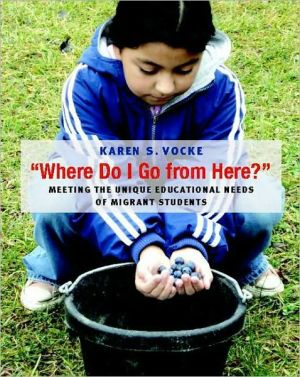Resiliency and Success: Migrant Children in the U.S.
This book elucidates the amazing life journeys of academically successful migrant students. Most literature on Hispanic students - especially the children of migrant farm workers who have been referred to as the 'invisible children' or the children of 'ghost workers' - has focused on the sociocultural factors that have contributed to their low level of achievement, high attrition rates, and other academic failures. Such studies lead to a deficit model, portraying Hispanic children as...
Search in google:
Garza (University of Texas-San Antonio) presents the stories of successful high school and college students who come from migrant farm laboring families, in an effort to help teachers, education students, researchers, and policy makers understand factors that lead to success for minority language students. The original study was conducted from an ethnographic perspective, using qualitative approaches that require fine-tuned analysis of ethno-historical and interview data. Students speak in their own words in numerous excerpts from interviews, and the authors use lessons learned from their stories to make recommendations for schools and educational policy. Annotation ©2004 Book News, Inc., Portland, OR
Ch. IThe immigration experience and resiliency of Mexican families in the United States1The context of Mexican immigration2Immigration stressors4School performance of Mexican children6Resiliency10Social network support12External support13Personal attributes14Ch. IIMigrant farm workers and their children16Role and profile of the migrant farm worker16The migrant child's educational experience18The educational system22A compensatory program : the migrant education program23Mid-1960s to early 1970s : segregated classrooms24Early and mid-1970s : segregated, six months, extended day24Mid- and late 1970s : return to segregated classrooms25Late 1970s to late 1980s : integrated/remedial pullout programs25Early 1990s to present : pullout accelerated instruction25Present-day approaches : schoolwide projects26Purpose of the migrant education program26Summary27Ch. IIIThe struggles of the migrant lifestyle28Introduction28Belinda's experience29Benito's experience35Sonia's experience40Ch. IVThe family - support and influence47Belinda's biographical data47Benito's biographical data55Sonia's biographical data63Ch. VThe school69School work versus field work : mental versus physical69Belinda's school life and experiences69Benito's school life and experiences79Sonia's school life and experiences83Ch. VIThe mentors - environmental resources92The human connection : "You can! I will help you"92Belinda's mentors : "If it hadn't been for you"92Benito's mentor : "He turned my life around"94Sonia's mentors : "They were always encouraging us to do our best"96Ch. VIIThe present - success against all odds99Belinda99Belinda's view of success and reflection100Benito102Benito's views of success and reflection105Sonia106Sonia's views of success and reflection108Destiny's architect108Belinda : "I could do anything I really wanted to do"109Benito : "I'm going to show them because I don't like to lose"110Sonia : "I'll show you I can make it, and I will"111Ch. VIIIAnalysis of central research questions113Related themes115Stressors : sociocultural factors117Mobility117Poverty118Ethnic and language minority status119Children's need to work119Family income and composition120Educational and occupational status120Substandard housing121Absence of learning materials121Personal characteristics : personal resources121Sonia123Belinda124Benito125Support : environmental resources125Family support126School support129Expectations and caring131Family expectations131Caring families132School expectations132Coping strategies133Ch. IXLessons learned about critical ethnography and pedagogy136This ethnographic research project137Lessons learned from the study141Critical ethnography144A Vygotskian pedagogy of hope147

